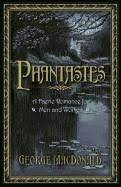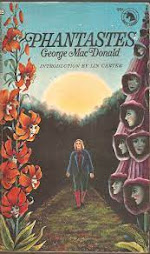I determined to finally read Phantastes, the book that inspired C.S. Lewis and others.
I now understand what it is MacDonald did.
In truth, the book isn't much in terms of plot. The narrator enters Fairy Land, where he encounters a number of people and monsters and locations and stories told within stories. There is no clear narrative arc--that is, certain encounters never seem (on the surface) to be paid off.
On the other hand, for someone familiar with C.S. Lewis and Lewis's opinion of MacDonald--and MacDonald's biography--the religious themes are clear; in many ways, the book resembles Pilgrim's Progress, being the tale of a man undertaking a journey that will fundamentally change his moral character and enlighten his mind.
However, MacDonald is far less heavy-handed. He is also entirely unapologetic. MacDonald doesn't attempt to explain the link between Fairy Land and God (as C.S. Lewis did). All things are God's creations. End of argument.What makes MacDonald so entirely extraordinary is (1) the effortless description. Fantasy readers will recognize the people and locations and tropes and motifs. Like C.S. Lewis and Tolkien--and the Romantic poets--MacDonald knows his fairy tales so well, he can use them with entire unself-consciousness. The scenes roll off the page, becoming more and more solid while growing more and more fantastical.
(2) The lack of ickiness.
The book has a surreal quality shared by dreams and fantasy art, yet it is not icky, as dreams and Surrealism (for instance) can be: Dali without the gross aspect.
I don't know how MacDonald does this--he utilizes horror in his writing with the same ease as fantasy, dream states, tragedy, and realism. MacDonald is one of the few writers to provide a death (one of the stories within a story) that uplifted me rather than leaving me vaguely unsettled, depressed, or, even, deliberately spiritual. Simply, "Ah, yes, of course."
 Phantastes is a bit dense on the exposition side and, as mentioned above, there isn't much of a narrative arc (that I could figure out). To experience what MacDonald does in Phantastes without the long passages, I recommend The Golden Key: A Victorian Fairy Tale by George MacDonald, illustrated by Ruth Sanderson.
Phantastes is a bit dense on the exposition side and, as mentioned above, there isn't much of a narrative arc (that I could figure out). To experience what MacDonald does in Phantastes without the long passages, I recommend The Golden Key: A Victorian Fairy Tale by George MacDonald, illustrated by Ruth Sanderson.
The combination of text and illustrations is impressive. Even more impressive is that the illustrations are entirely in black & white and yet, combined with the text, they exude color.
A beautiful volume and a testament to the key or light that MacDonald provided so many writers.



No comments:
Post a Comment